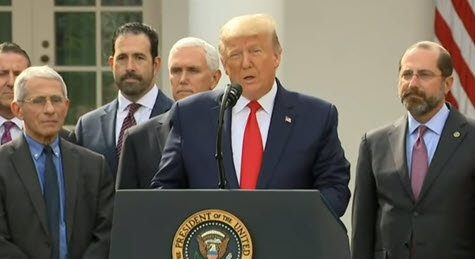
Leading policymakers floated ideas on a “Phase 4” coronavirus relief package this week immediately after the CARES Act (Phase 3) was signed into law last Friday. (Roundtable Weekly, March 27)
- House Speaker Nancy Pelosi (D-CA) adjusted her messaging from earlier in the week that another massive legislative package should include economic recovery projects such as infrastructure improvements. Today, she emphasized Phase 4 should provide additional direct payments to individuals and expanded loans for businesses. (CNBC, April 3)
- “I think right now we need a fourth bipartisan bill—and I think the bill could be very much like the bill we just passed. So I’d like to go right back and say ‘let’s look at that bill. Let’s update it for some other things that we need,’ and again put money in the pockets of the American people,” Pelosi told CNBC’s Squawk on the Street today. She added, “While I’m very much in favor of doing what we need to do to meet the needs of clean water, more broadband and the rest of that,that may have to be for a bill beyond this.”
- On March 31 a broad-based business coalition, including The Real Estate Roundtable, urged President Trump and congressional leaders to establish a COVID-19 Business and Employee Continuity and Recovery Fund. (Coalition comment letter, March 31)
- The proposed Recovery Fund would provide additional liquidity for impaired industries and businesses to avoid an unprecedented systemic, economic crisis. The coalition states the establishment of the Fund is necessary to supplement lending expansion efforts included in the $2.2 trillion CARES Act. (Roundtable Weekly, March 27)
- The coalition letter states, “Without broad-based and expeditious federal action, long-term damage to the financial markets, rampant unemployment, and irreparable harm to communities are almost certain.”
- Additionally, Roundtable President and CEO Jeffrey DeBoer yesterday wrote to Treasury Secretary Steve Mnuchin and Small Business Administration (SBA) Adminstrator Jovita Carranza urging the release of important clarifications to small business loan issues included in last week’s CARES Act. (Payroll Protection Program letter, April 2)
- The Payroll Protection Program (PPP) included in the CARES Act provides an additional $367 billion to SBA to assist small businesses and contains a number of provisions aimed at granting temporary regulatory relief. (Top-line overview of the program and PPP Interim Final Rule)
- The April 2 letter recommends 13 principles and clarifications to PPP based on questions from Roundtable members who are trying to determine whether their businesses are eligible under the new loan program. The letter requests that Congress’s intent should be implemented by providing as much loan assistance as possible to as many small businesses as possible.
- Late yesterday, Treasury issued an update to its PPP Borrower Application Form. (Treasury Dept Assistance for Small Businesses webpage and The Roundtable’s Coronavirus webpage resources.)
- Today, the launch of the Payroll Protection Program was met with widespread reports about chaotic attempts to use the PPP portal – unprepared banks not accepting applications; confusion about the need to revise loan applications; and the SBA website crashing from heavy demand. (Politico, April 2 and Axios, April 3)
- However, GlobeSt reported today that anecdotal examples show retail tenants are taking a positive stance in negotiations with landlords. “Tenants and landlords are being proactive and cooperative with each other, although there have been exceptions with some tenants engaging in hardball with their landlords,” according to the April 3 article.
For the business community, a number of financial programs are available from the CARES ACT, depending on how many workers are employed by a given business concern. See Roundtable summaries of provisions that target:
- Independent contractors, sole proprietors, and businesses with 500 employees or less
- Mid-sized businesses with 501 to 10,000 employees
- Businesses with any number of employees over 500
- Tax Considerations
As negotiations begin on a framework for a Phase 4 relief package between the House of Representatives and the Administration, the Senate is scheduled to return from recess on April 20. The Roundtable will remain engaged at all levels and offer timely policy alerts as the coronavirus crisis continues to unravel.
# # #











